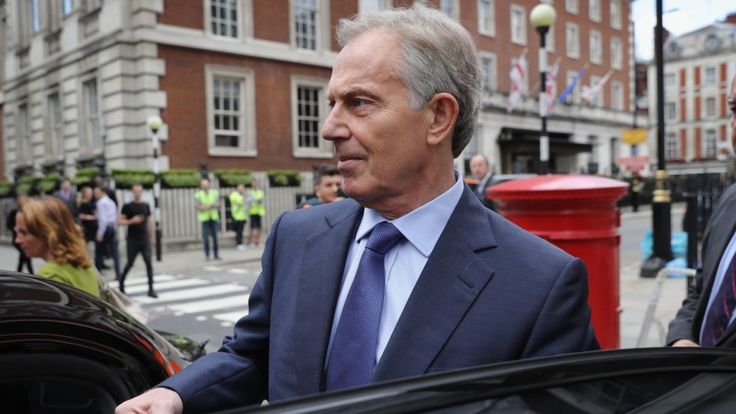 GETTY IMAGES
GETTY IMAGESSir John Chilcot has outlined his findings on the UK's involvement in the 2003 Iraq War and the lessons to be learned from it.
The report spans almost a decade of UK government policy decisions between 2001 and 2009.
It covers the background to the decision to go to war, whether troops were properly prepared, how the conflict was conducted and what planning there was for its aftermath, a period in which there was intense sectarian violence.
The main points are:
- The UK chose to join the invasion of Iraq before the peaceful options for disarmament had been exhausted. Military action at that time was not a last resort.
- Military action might have been necessary later, but in March 2003: There was no imminent threat from Saddam Hussein; The strategy of containment could have been adapted and continued for some time; The majority of the Security Council supported continuing UN inspections and monitoring.
- Judgements about the severity of threat posed by Iraq's weapons of mass destruction - known as WMD - were presented with a certainty that was not justified.
- Intelligence had "not established beyond doubt" that Saddam Hussein had continued to produce chemical and biological weapons.
- Policy on Iraq was made on the basis of flawed intelligence assessments. It was not challenged, and should have been.
- The circumstances in which it was decided that there was a legal basis for UK military action were "far from satisfactory".
- The invasion began on 20 March 2003 but not until 13 March did then Attorney General Lord Goldsmith advise there was on balance a secure legal basis for military action. Apart from No 10's response to his letter on 14 March, no formal record was made of that decision and the precise grounds on which it was made remain unclear.
- The UK's actions undermined the authority of the United Nations Security Council: The UN's Charter puts responsibility for the maintenance of peace and security in the Security Council. The UK government was claiming to act on behalf of the international community "to uphold the authority of the Security Council". But it knew it did not have a majority supporting its actions.
- In Cabinet, there was little questioning of Lord Goldsmith about his advice and no substantive discussion of the legal issues recorded.
- There was "little time" to properly prepare three military brigades for deployment in Iraq. The risks were neither "properly identified nor fully exposed" to ministers, resulting in "equipment shortfalls".
- Between 2003 and 2009, UK forces in Iraq faced gaps in some key capability areas - including armoured vehicles, reconnaissance and intelligence assets and helicopter support.
- It was not sufficiently clear which person in the department within the Ministry of Defence had responsibility for identifying and articulating such gaps.
- Delays in providing adequate medium weight protected patrol vehicles and the failure to meet the needs of UK forces for reconnaissance and intelligence equipment and helicopters should not have been tolerated.
- On 28 July 2002, the then Prime Minister Tony Blair assured US President George W Bush he would be with him "whatever". But in the letter, he pointed out that a US coalition for military action would need: Progress on the Middle East peace process; UN authority; and a shift in public opinion in the UK, Europe, and among Arab leaders.
- Despite explicit warnings, the consequences of the invasion were underestimated. The planning and preparations for Iraq after Saddam Hussein were "wholly inadequate".
- The government failed to achieve the stated objectives it had set itself in Iraq. More than 200 British citizens died as a result of the conflict. Iraqi people suffered greatly. By July 2009, at least 150,000 Iraqis had died, probably many more. More than one million were displaced.
- The report sets out lessons to be learned: It found Mr Blair overestimated his ability to influence US decisions on Iraq; and the UK's relationship with the US does not require unconditional support.
- It said ministerial discussion which encourages frank and informed debate and challenge is important. As is ensuring civilian and military arms of government are properly equipped.
- In future, all aspects of any intervention need to be calculated, debated and challenged with rigour. Decisions need to be fully implemented.
Are you looking through the Chilcot Report? Have you spotted something which hasn't yet been covered by BBC News? Email haveyoursay@bbc.co.uk with your comments and page reference numbers.
You can also contact us in the following ways:
- WhatsApp: +44 7525 900971
- Tweet: @BBC_HaveYourSay
- Send pictures/video to yourpics@bbc.co.uk
- Upload your pictures/video here
- Text an SMS or MMS to 61124 (UK) or +44 7624 800 100 (international)
Or use the form below
UK Politics
Iraq War 'not last resort' - Chilcot
- 6 July 2016
- UK Politics
What Blair said to Bush in memos
- 6 July 2016
- UK
Leadsom and Gove vie to take on May
- 6 July 2016
- UK Politics
No comments:
Post a Comment